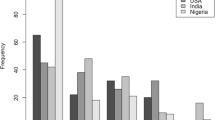Abstract
This article studies the process of climatization of the French military initiated with the 21st Conference of the Parties in 2015 through an analysis of the discourses produced by military actors on climate change. I will argue that there are two ways in which the climatization of the military discourse operates. First, it leads to a reframing of existing security narratives such as migrations or armed conflicts through a climatic lens, which creates a sense of urgency and intensity. Second, the climatization of the military discourse is mediated by a riskification of climate change, through the adoption of a risk-based approach to prevent its security implications. It creates a sense of uncertainty and leads to the climatization of a growing number of security issues such as terrorism or illegal fisheries. Both processes contribute to legitimize military solutions in global climate governance and expand the scope of intervention of the armed forces.
Similar content being viewed by others
Notes
Personal interview conducted with a civil servant of the DGRIS in Paris (March 1, 2019).
Personal interview conducted with a civil servant of the DGRIS in Paris (July 3, 2018).
Personal interview conducted with a civil servant of the DGRIS in Paris (November 23, 2018).
These data are based on the analysis of the Observatory’s website (https://www.defense.gouv.fr/dgris/recherche-et-prospective/observatoires/observatoire-geopolitique-des-enjeux-des-changements-climatiques) and interviews conducted with its coordinators.
Personal interview conducted with a civil servant of the DGRIS in Paris (July 3, 2018).
Personal interview conducted with a military officer of the DGRIS in Paris (October 10, 2018).
Personal interview conducted with a military officer of the DGRIS in Paris (September 28, 2018).
Personal interview conducted with a civil servant of the DGRIS in Paris (July 8, 2018).
Personal interview conducted with an expert of the Observatory in Paris (December 8, 2018).
Personal interview conducted with a military officer of the General Staff (October 24, 2018).
Personal interview conducted with a military officer of the General Staff (November 12, 2018).
Personal interview conducted with a civil servant of the DGRIS in Paris (July 3, 2018).
References
Alex, B., H. Kempf, and A. Coldefy. 2014. Conséquences du Dérèglement Climatique pour le Ministère de la Défense. Paris: Institut de Relations Internationales et Stratégiques (IRIS).
Aykut, S.C., and A. Dahan. 2015. Gouverner le climat ?. Paris: Presses de Sciences Po.
Aykut, S.C., J. Foyer, and E. Morena (eds.). 2017. Globalising the Climate: COP21 and the Climatisation of Global Debates. London: Routledge.
Balzacq, T. 2015. The 'Essence' of securitization: Theory, ideal type, and a sociological science of security. International Relations 29 (1): 103–113.
Balzacq, T. 2019. Securitization Theory: Past, Present, and Future. Polity 51 (2): 331–348.
Beck, U. 1997. Risk Society: Towards a New Modernity. London: Sage.
Bigo, D. 2014. The (In)securitization Practices of the Three Universes of EU Border Control: Military/Navy—Border Guards/Police—Database Analysts. Security Dialogue 45 (3): 209–225.
Boulanger, P. 2010. Du bon usage de l’environnement par les armées. Le début des stratégies nationales militaires de développement durable. Cahiers de géographie du Québec 54: 313–336.
Briggs, C.M. 2012. Climate Security, Risk Assessment and Military Planning. International Affairs 88 (5): 1049–1064.
Buzan, B., O. Waever, and J. Wilde. 1998. Security: a New Framework for Analysis. London: Lynne Rienner Publishers.
Cecil, P.F. 1986. Herbicidal Warfare: The Ranch Hand Project in Vietnam. New York: Praeger.
Corry, O. 2012. Securitisation and ‘riskification’: Second-Order Security and the Politics of Climate Change. Millennium 40 (2): 235–258.
Dalby, S. 2013. Climate Change: New Dimensions of Environmental Security. The RUSI Journal 158 (3): 34–43.
Department of Defense. 2014. The 2014 Quadrennial Defense Review, 2014. Washington: U.S. Government Printing Office.
Department of the Navy. 2009. Navy Arctic Roadmap. Washington, DC: Vice-Chief of Naval Operations.
Durant, R.F. 2007. The Greening of the US Military: Environmental Policy, National Security, and Organizational Change. Washington, DC: Georgetown University Press.
Dycus, S. 1996. National Defense and the Environment. Hanover, New Hampshire: University Press of New England.
Elbe, S. 2009. Virus Alert: Security, Governmentality, and the AIDS Pandemic. New York: Columbia University Press.
Floyd, R. 2011. Can Securitization Theory be Used in Normative Analysis? Towards a Just Securitization Theory. Security Dialogue 42 (4/5): 427–439.
Floyd, R. 2010. Security and the Environment: Securitisation Theory and US Environmental Security Policy. Cambridge: Cambridge University Press.
Floyd, R., and R.A. Matthew (eds.). 2013. Environmental security. London: Routledge.
Heng, Y-K. 2006. The transformation of war debate: Through the looking glass of Ulrich Beck's World Risk Society. International Relations 20 (1): 69–91.
Hulme, M., and M. Mahony. 2010. Climate Change: What do We Know About the IPCC? Progress in Physical Geography 34 (5): 705–718.
Huysmans, J. 2006. The Politics of Insecurity: Fear, Migration and Asylum in the EU. New York: Routledge.
Kateri, C. 2010. Private security contractors and new wars: Risks, laws and ethics. London; New York: Routledge.
Lacy, M. 2005. Security and Climate Change: International Relations and the Limits of Realism. London; New York: Routledge.
Maertens, L. 2015. Quand le bleu passe au vert : la sécurisation de l’environnement à l’ONU. PhD dissertation, Institut d’Etudes Politiques de Paris, Paris.
Maertens, L. 2019. From Blue to Green? Environmentalization and Securitization in UN Peacekeeping Practices. International Peacekeeping 26 (3): 302–326.
Maertens, L. and A. Baillat. 2017. The partial climatisation of migration, security and conflict. In Globalising the Climate: COP21 and the Climatisation of Global Governance, ed. S. C. Aykut, J. Foyer and E. Morena. London: Routledge
McDonald, M. 2013. Discourses of Climate Security. Political Geography 33: 42–51.
Ministry of Defense. 2015. Synthesis of the International Conference of Defense Ministers and Senior Officials on the Implications of Climate Change for Defense. Paris: DGRIS.
Ministry of the Armed Forces. 2017. Strategic Review of Defense and National Security. Paris: SGA.
Oels, A. 2012. From ‘securitization’ of Climate Change to ‘climatization’ of the Security Field: Comparing Three Theoretical Perspectives. In Climate Change, Human Security and Violent Conflict: Challenges for Societal Stability, ed. J. Scheffran, M. Brzoska, H.G. Brauch, P.M. Link, and J. Schilling, 185–205. Berlin: Springer.
Oels, A. 2013. Rendering Climate Change Governable by Risk: From Probability to Contingency. Geoforum 45: 17–29.
Rasmussen, M.V. 2001. Reflexive security: NATO and international risk society. Millenium 30 (2): 285–309.
Rasmussen, M.V. 2006. The Risk Society at War: Terror, Technology and Strategy in the Twenty-First Century. Cambridge: Cambridge University Press.
Revet, S., and J. Langumier. 2015. Governing Disasters: Beyond Risk Culture. New York: Palgrave Macmillan.
Robinson, J.P. (ed.). 1979. The Effects of Weapons on Ecosystems. Oxford: Pergamon Press.
Schmitt, C. 1996. The Concept of the Political. Chicago: University of Chicago Press.
Schwartz, P., and D. Randall. 2003. An Abrupt Climate Change Scenario and Its Implications for United States National Security. Pasadena, CA: Jet Propulsion Laboratory.
Shulman, S. 1992. The Threat at Home: Confronting the Toxic Legacy of the U.S. Military. Boston: Beacon Press.
The Center for Naval Analyses. 2007. National Security and the Threat of Climate Change. Washington, DC: The CNA Corporation.
Trombetta, M.J. 2008. Environmental Security and Climate Change: Analysing the Discourse. Cambridge Review of International Affairs 21 (4): 585–602.
UN Environment. 2007. Sudan: Post-Conflict Environmental Assessment. Nairobi: United Nations Environmental Program.
United Nations Secretary General. 2009. UN Secretary-General’s Report on “Climate Change and its Possible Security Implications” (A/64/350). New York: United Nations General Assembly.
von Lucke, F., Z. Wellmann, and T. Diez. 2014. What’s at Stake in Securitising Climate Change? Towards a Differentiated Approach. Geopolitics 19 (4): 857–884.
Westing, A.H. (ed.). 1984. Herbicides in War: The Long-Term Ecological and Human Consequences. London: Taylor & Francis.
Westing, A.H. (ed.). 1988. Cultural Norms, War and the Environment. Oxford: Oxford University Press.
Zanotti, L. 2010. UN integrated peacekeeping operations and NGOs: Reflections on governmental rationalities and contestation in the age of risk. International Peacekeeping 17 (1): 17–31.
Zierler, D. 2011. The Invention of Ecocide. Athens: University of Georgia Press.
Author information
Authors and Affiliations
Corresponding author
Ethics declarations
Conflict of interest
Author states that there is no conflict of interest.
Additional information
Publisher's Note
Springer Nature remains neutral with regard to jurisdictional claims in published maps and institutional affiliations.
Rights and permissions
About this article
Cite this article
Estève, A. Preparing the French military to a warming world: climatization through riskification. Int Polit 58, 600–618 (2021). https://doi.org/10.1057/s41311-020-00248-2
Published:
Issue Date:
DOI: https://doi.org/10.1057/s41311-020-00248-2




